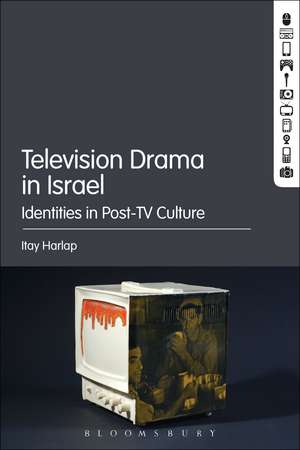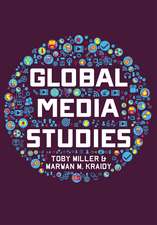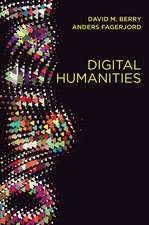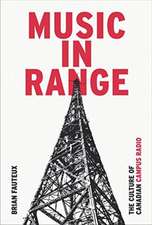Television Drama in Israel: Identities in Post-TV Culture
Autor Itay Harlapen Limba Engleză Hardback – 4 oct 2017
| Toate formatele și edițiile | Preț | Express |
|---|---|---|
| Paperback (1) | 168.70 lei 22-36 zile | +18.38 lei 6-12 zile |
| Bloomsbury Publishing – 17 apr 2019 | 168.70 lei 22-36 zile | +18.38 lei 6-12 zile |
| Hardback (1) | 714.92 lei 43-57 zile | |
| Bloomsbury Publishing – 4 oct 2017 | 714.92 lei 43-57 zile |
Preț: 714.92 lei
Preț vechi: 1027.91 lei
-30% Nou
Puncte Express: 1072
Preț estimativ în valută:
136.84€ • 148.69$ • 115.02£
136.84€ • 148.69$ • 115.02£
Carte tipărită la comandă
Livrare economică 21 aprilie-05 mai
Preluare comenzi: 021 569.72.76
Specificații
ISBN-13: 9781501328930
ISBN-10: 150132893X
Pagini: 224
Ilustrații: 30 bw illus
Dimensiuni: 152 x 229 mm
Greutate: 0.5 kg
Editura: Bloomsbury Publishing
Colecția Bloomsbury Academic
Locul publicării:New York, United States
ISBN-10: 150132893X
Pagini: 224
Ilustrații: 30 bw illus
Dimensiuni: 152 x 229 mm
Greutate: 0.5 kg
Editura: Bloomsbury Publishing
Colecția Bloomsbury Academic
Locul publicării:New York, United States
Caracteristici
Show how series that are now best known for their international success were devised within a specific local context and the meanings they have in the country in which they were created
Notă biografică
Itay Harlap teaches television studies and film theory at Sapir Academic College, Israel, and at the The Steve Tisch School of Film and Television, Tel Aviv University, Israel. His articles have appeared in Jewish Film & New Media, Misgarot Media [in Hebrew], Mikan [in Hebrew], Critical Studies in Television, and GLQ, A Journal of Lesbian and Gay Studies. Harlap is among the founders and organizers of the "Fiktzia" annual conference on Israeli television studies.
Cuprins
List of FiguresPreface Acknowledgements1. Half a Century of Israeli Identities Through Television Before Television Television Aleph (A), or the Period of Single-Channel ConsensusTelevision Beit (B), or the Period of Channel 2's DominanceTelevision Gimel (C) or Israeli Post-Television2. Bringing Back the Nation: BeTipul's Male Warrior Trauma, Zionism, and masculinityDan Halutz and the trauma of the victimizer Menachem Yerushalmi and the working through of trauma Uri Kahana and the trauma of heterosexual masculinity3. It's Not TV, It's BeTipul: Rethinking 'Israeliness' BeTipul: Text and context 'BeTipul is symbolic of Israeli society' 'BeTipul is a controversial series' 'BeTipul is not regular television' 'BeTipul is produced by talented creators' 'BeTipul is psychologically profound' Conclusion, or The Text Also Speaks 4. Bad Television/Good (Post) Television: Aging and Masculinity in Nevelot [Eagles] Old Age and the Bad ObjectTelevision as Bad ObjectNevelot as Good Object5. Small-Screen Trauma: Seriality and Post-Trauma in Parashat HaShavua and Waltz With BashirShaul the DreamerBetween Parashat HaShavua and Waltz With BashirSecond Season, Tenth Episode, Last Scene6. 'Black Box': Memory, Television, and Ethnicity in Zaguri ImperiaTwenty Years On: Sh'chur and ZaguriFrom 'Dancers Dancing in the Snow' to 'Habibi Diali''All But the White Foam': Television and MemoryConclusion, or 'What's the Moral of the Story?'7. The New Normative: Gay Fatherhood on Israeli TelevisionFrom Criminals and 'Sick People' to Gay FathersNormative Gay Parenting on Israeli Broadcast TelevisionIma VeAbbaz (Mom and Dads)8. Conclusion and Some Observations on Israeli Reality TVReferencesTelevisionFilm
Recenzii
[Harlap] does an excellent job of exploring the historical and cultural contexts that have led to the popularity of these drama series, and the ways in which they have explored pertinent and often painful issues such as trauma (including cultural trauma) and victimisation, Israeliness, ageing and masculinity, and gay fatherhood ... The book offers an insightful analysis ... relevant for researchers and students beyond the Israeli context as well.
This is a stylishly written, readable and persuasive analysis of a selection of contemporary Israeli television that will be of considerable interest and value to students and researchers alike. One of the main strengths of the book is that it engages directly with programmes, via coherent and conceptually informed case studies that bring new material into the scholarly domain and combine close textual analysis with a discussion of Israeli society and culture. A second major strength of Dr Harlap's writing is that, although tightly focused on contemporary Israeli TV drama, he adopts critical, conceptual and theoretical frameworks that connect directly with the wider field of Television Studies: for example, 'post-TV' - indeed, 'post-Israel' -, cultural and psychological notions of trauma and the politics of representation. This book is an important contribution to the growing field of Israeli Television Studies, whilst several of the case studies - the chapter on representations of gay fatherhood, for example - pick up on representational and political issues that will resonate beyond Israel.
Television Drama in Israel is a brilliant study of the collapse of the Zionist ideal of the "New Jew" as it is represented in five Israeli TV dramas. Through an insightful analysis of both themes and structures, the book shows how the Jewish masculine, Ashkenazi heterosexual hero is replaced by repressed identities of Arab-Jews, LGBT, or an effeminate protagonist. Arguing that this transformation reflects, as well as effects, Israeli society's new Post-Zionist era, the book utilizes an intricate study of personal and collective traumas to impressively expose new perceptions of victims and of perpetrators as they are represented in Post-TV dramatic articulations.
Itay Harlap's book provides a fresh and detailed analysis on core themes in Israeli culture through what has until now been an under explored perspective- that of Israeli television productions. It is therefore an important and illuminating contribution to the fields of both Israel and Television Studies that researchers will find as a valuable text in their courses.
This is a stylishly written, readable and persuasive analysis of a selection of contemporary Israeli television that will be of considerable interest and value to students and researchers alike. One of the main strengths of the book is that it engages directly with programmes, via coherent and conceptually informed case studies that bring new material into the scholarly domain and combine close textual analysis with a discussion of Israeli society and culture. A second major strength of Dr Harlap's writing is that, although tightly focused on contemporary Israeli TV drama, he adopts critical, conceptual and theoretical frameworks that connect directly with the wider field of Television Studies: for example, 'post-TV' - indeed, 'post-Israel' -, cultural and psychological notions of trauma and the politics of representation. This book is an important contribution to the growing field of Israeli Television Studies, whilst several of the case studies - the chapter on representations of gay fatherhood, for example - pick up on representational and political issues that will resonate beyond Israel.
Television Drama in Israel is a brilliant study of the collapse of the Zionist ideal of the "New Jew" as it is represented in five Israeli TV dramas. Through an insightful analysis of both themes and structures, the book shows how the Jewish masculine, Ashkenazi heterosexual hero is replaced by repressed identities of Arab-Jews, LGBT, or an effeminate protagonist. Arguing that this transformation reflects, as well as effects, Israeli society's new Post-Zionist era, the book utilizes an intricate study of personal and collective traumas to impressively expose new perceptions of victims and of perpetrators as they are represented in Post-TV dramatic articulations.
Itay Harlap's book provides a fresh and detailed analysis on core themes in Israeli culture through what has until now been an under explored perspective- that of Israeli television productions. It is therefore an important and illuminating contribution to the fields of both Israel and Television Studies that researchers will find as a valuable text in their courses.









